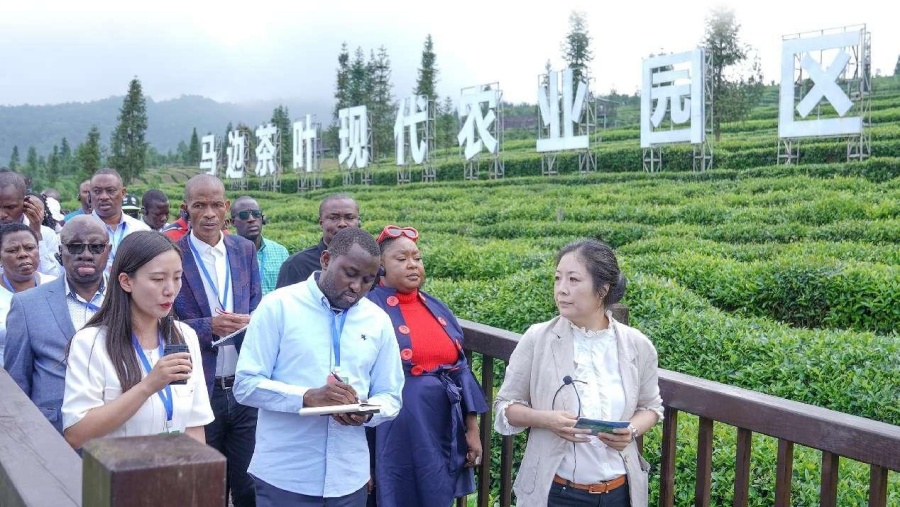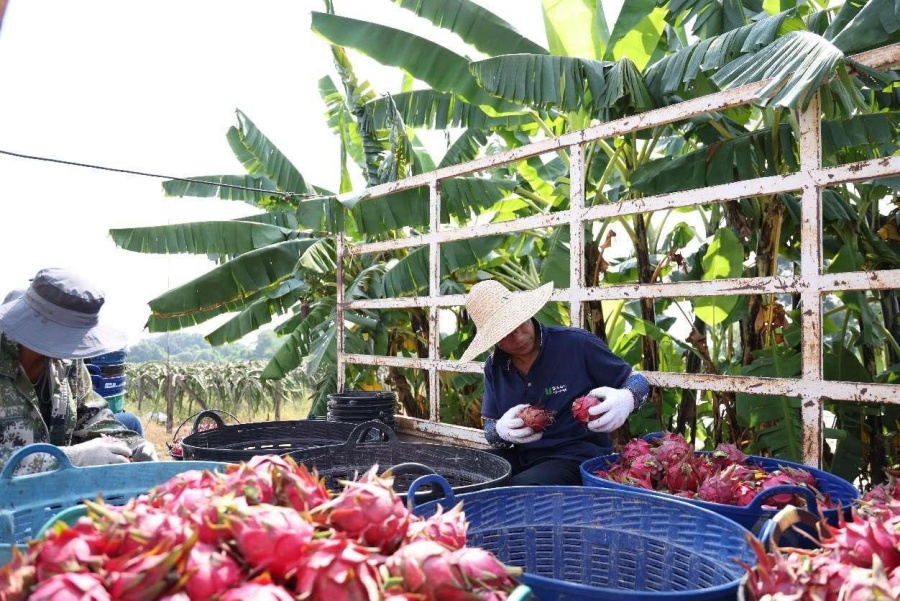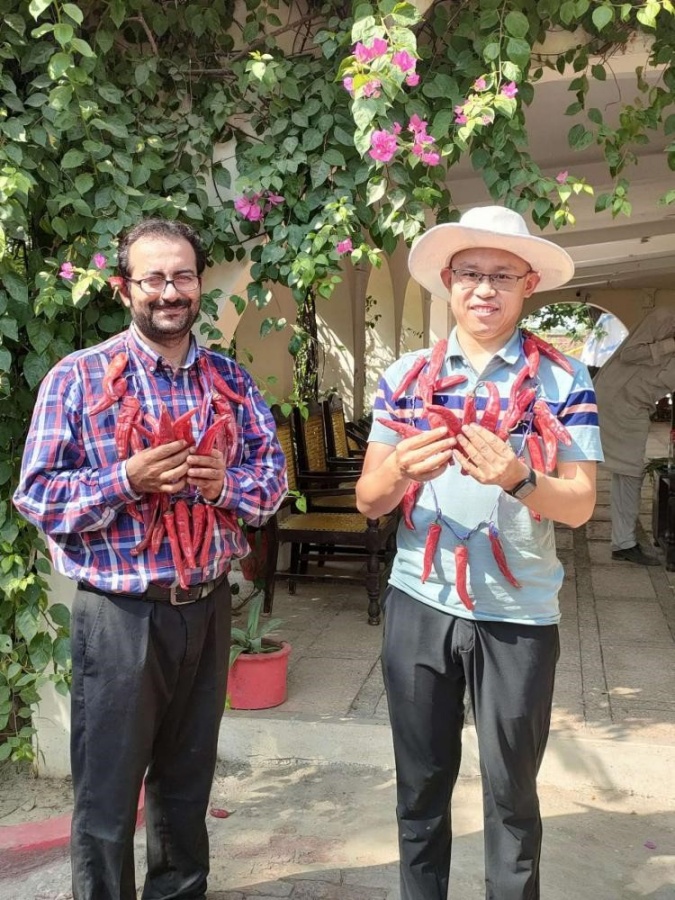Global significance of China's poverty alleviation theories and practices

Photo shows African officials visiting a modern tea plantation in Leshan, southwest China's Sichuan province, during the first Seminar on Poverty Reduction and Development for African Officials held in May this year. [People's Daily/Song Haoxin]
China's story of poverty alleviation, one about lifting 800 million people out of poverty and meeting the poverty reduction target of the UN's 2030 Agenda for Sustainable Development ahead of schedule, is one of the most magnificent chapters in global development.
These historic achievements have deepened humanity's understanding of poverty alleviation and enriched the theoretical framework for combating poverty worldwide.
On Nov. 18, Chinese President Xi Jinping delivered a speech at Session I of the 19th G20 Summit on Fight Against Hunger and Poverty. He said, "China's story is proof that developing countries can eliminate poverty, that a weaker bird can start early and fly high, when there is the endurance, perseverance, and striving spirit that enables water drops to penetrate rocks over time and turns blueprints into reality."
Osmar Junior, executive secretary of Brazil's Ministry of Development and Social Assistance, Family and Fight against Hunger, noted that Xi has gained rich experience in poverty reduction when working in China's impoverished regions. Junior said that Xi has a profound understanding of national governance and social development, adding that China's experience will help Brazil and other developing countries find a way to get rid of poverty and achieve sustainable development.
In the battle against poverty, China always places the people front and center. It has made targeted policies tailored to each village, each household and each person, helped localities generate growth by fostering industries with distinctive features, and promoted common prosperity by pairing up well-off regions with less developed ones. Such experiences have given inspiration for other countries that if China can eliminate poverty, other developing countries can make it too. This is what China's battle against poverty says to the world.
According to Samuel Darkwa, a governance fellow at the Institute of Economic Affairs, Ghana, China has followed a targeted approach to poverty alleviation, which involves accurate identification of impoverished people, customized projects, and efficient resource allocation. China's experience provides positive guidance for African countries in improving the livelihood of their vulnerable populations, said Darkwa.

Local farmers sort dragon fruits at a China-Laos experimental station for good crop varieties in Vientiane, Laos. [People's Daily/Yang Yi]
Darkwa said that through a people-centered approach, China has identified the causes of poverty, learned about the needs of impoverished households, and taken tailored measures, which has significantly enhanced the effectiveness of its poverty alleviation efforts.
Austin Maho, editor-in-chief of Nigeria's Daybreak newspaper, has thoroughly read Xi's book on poverty relief, "Up and Out of Poverty." He also visited many places in China, such as southwest China's Guizhou province, to learn about local poverty alleviation measures such as relocating poor people, developing tourism, and leveraging science and technology to tackle poverty.
He observed that China has followed a development-driven strategy, with a focus on unleashing the economic vitality of rural areas. By implementing measures such as providing skills training, improving social welfare, and enhancing infrastructure, China has promoted economic growth in rural areas and created employment opportunities, he said.
Many countries around the world, especially those still plagued by poverty in the Global South, can study China's path of poverty alleviation to find ways out of poverty in line with their own national conditions, said Maho.
In its modernization drive, while improving the livelihood of its own people through development, China is also committed to advancing shared development of the whole world and helping other countries improve their people's livelihood.
During the G20 Hangzhou Summit, China placed development at the center of the G20's macroeconomic policy coordination for the first time. Since then, the country has put forward ten partnership action plans for modernization to deepen China-Africa cooperation and spearhead the Global South modernization. It also outlined eight actions for global development, and focused on improving and promoting the high-quality Belt and Road cooperation mechanisms to create new space for win-win development at a higher level and with greater resilience and sustainability.

A Chinese expert and a Pakistani technician involved in a China-Pakistan cooperation program for chili pepper planting celebrate the chili pepper harvest. [Photo/Waqas Ahmad]
China has always maintained a global vision and fulfilled its commitments with concrete actions, facilitating modernization of all countries featuring peaceful development, mutually beneficial cooperation, and common prosperity.
During the China-Central Asia Summit held in May last year, China and Uzbekistan set up a subcommittee on poverty reduction cooperation under the framework of the intergovernmental cooperation committee. It is the first subcommittee on poverty reduction that China established with other countries at the governmental level.
Uzbekistan has intensified efforts to reduce poverty in recent years, piloting China's anti-poverty experience in various regions across the country. Nearly 10,000 Uzbeks have participated in online training programs introducing China's poverty reduction experience and practices.
This year, China hosted many training programs for the Global South, such as the training program for commercialized agricultural (poultry) development for Lesotho, the fourth training session for Indonesian rural officials, a cotton production, processing and management training program for Uzbekistan, and the seminar on culture and tourism empowering high-quality rural development for ASEAN countries.
These training programs have revitalized the international poverty reduction cooperation and boosted the confidence of the Global South in breaking free from poverty.
Shahid Khaqan Abbasi, former prime minister of Pakistan, said that China's leading role in global development and its commitment to poverty eradication will continue to influence the world.
























